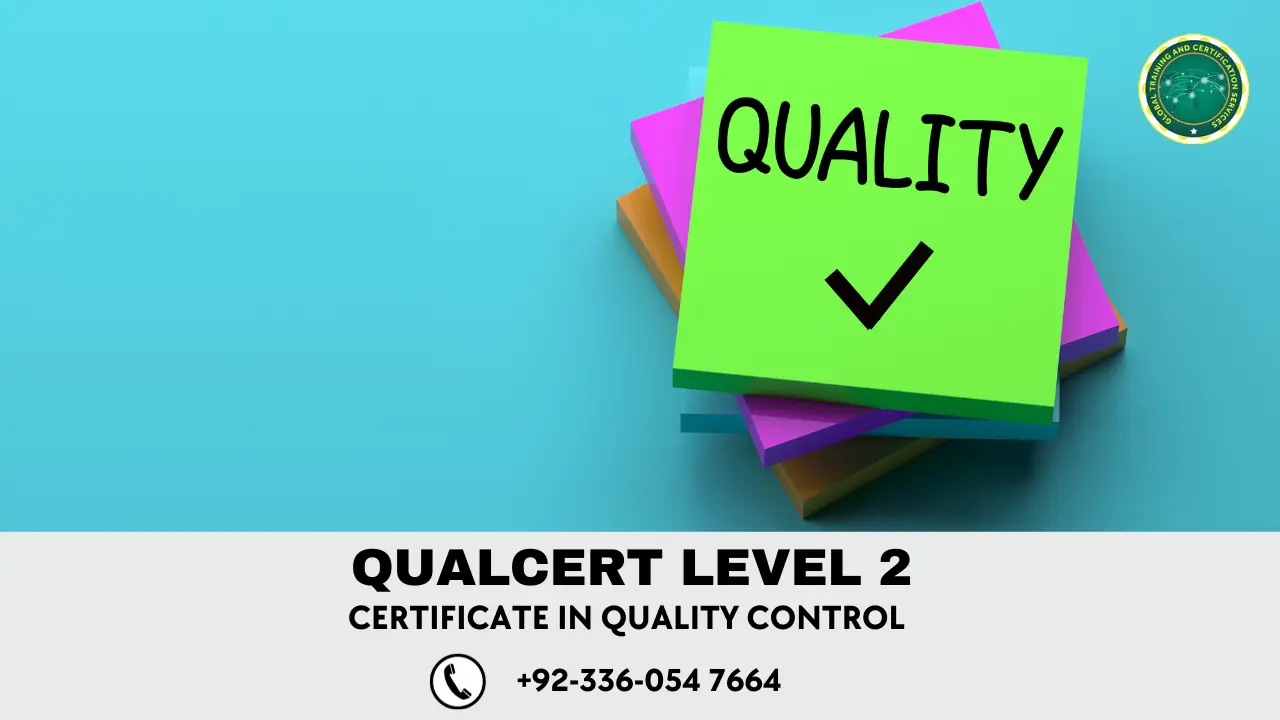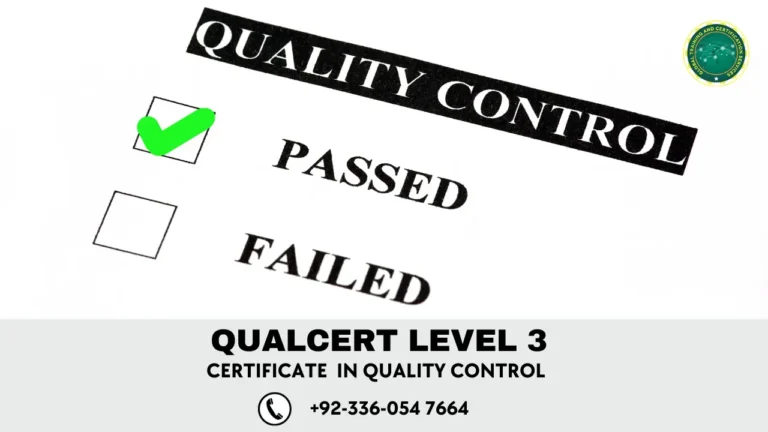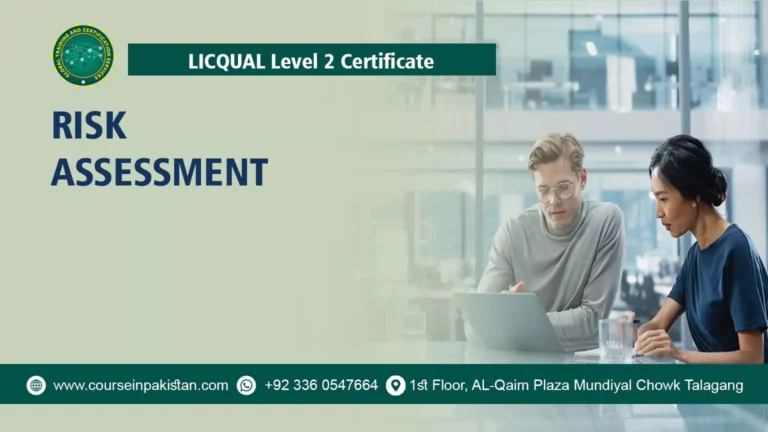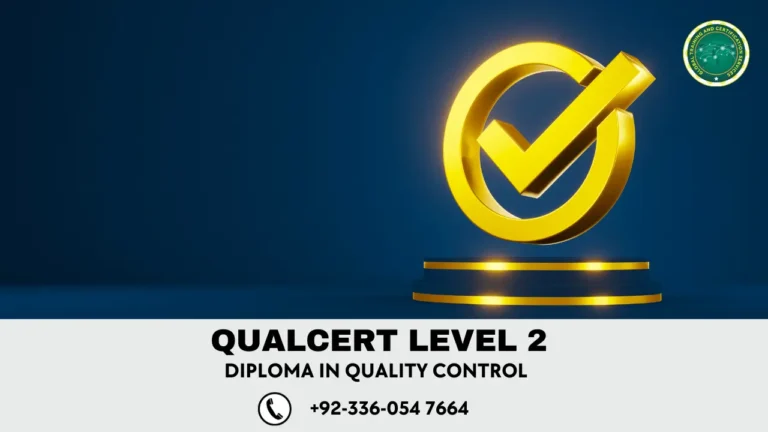
Level 2 Certificate in Quality Control (QC)
“Empowering Futures through Excellence in Quality Control – Level 1”
Are you ready to take your career to new heights? Dreaming of a future filled with exciting opportunities, impressive job titles, and a steady climb up the corporate ladder? Look no further – the Level 1 Certificate in Quality Control is your passport to success!
Why Choose Level 2 Certificate in Quality Control (QC)
- Fundamental Understanding: The Level 2 Certificate in QC provides a solid foundation in quality control principles and practices. It is an ideal starting point for those who are new to the field, ensuring that you grasp essential concepts and terminology.
- Career Advancement: Earning this certificate can open up new career opportunities and pathways. It is often a prerequisite for entry-level positions in quality control and quality assurance, making it an essential qualification for those aspiring to excel in this field.
- Industry Recognition: Many industries, including manufacturing, healthcare, and technology, highly value quality control professionals. Holding a Level 2 QC certificate can demonstrate your commitment to quality and make you stand out to employers.
- Improved Job Performance: The knowledge and skills acquired through this certification can directly enhance your on-the-job performance. You’ll be better equipped to identify and address quality issues, contributing to higher product or service standards.
- Quality Improvement: By understanding the fundamentals of quality control, you can contribute to improving processes, reducing defects, and enhancing overall product or service quality within your organization.
Your Future Awaits – Enroll Today!
The Level 2 Certificate in Quality Control (QC) is a credential that signifies an individual’s competence and knowledge in the field of quality control. Quality control is a crucial aspect of various industries, ensuring that products and services meet established standards and requirements. This certificate program typically covers fundamental concepts and practical skills related to quality control processes.
- Improved Product Quality: QC professionals are trained to identify defects and inconsistencies in products and processes. By implementing QC measures, organizations can ensure higher product quality, reducing defects and customer complaints.
- Cost Reduction: Quality issues can lead to costly recalls, rework, and customer dissatisfaction. A Level 2 QC Certificate helps individuals understand how to prevent defects and optimize processes, leading to cost savings for businesses.
- Increased Customer Satisfaction: High-quality products and services lead to satisfied customers. Organizations that invest in QC benefit from improved customer retention and positive word-of-mouth referrals.
- Compliance and Standards Adherence: Many industries have specific quality standards and regulations that must be met. A QC certificate provides knowledge of these standards and helps organizations remain compliant.
- Enhanced Efficiency: QC professionals are trained to streamline processes, eliminate waste, and reduce errors. This can result in increased productivity and efficiency for businesses.
- Career Advancement: For individuals, earning a Level 2 QC Certificate can open up career opportunities in various industries such as manufacturing, healthcare, and technology. It demonstrates expertise in quality control, making individuals more competitive in the job market.
- Problem-Solving Skills: QC training equips individuals with problem-solving skills that can be applied to various situations. This not only benefits their current roles but also prepares them for leadership positions.
- Reduced Liability: By ensuring that products meet quality standards and are safe for consumers, organizations can reduce the risk of legal liabilities and lawsuits.
- Continuous Improvement Culture: QC professionals often promote a culture of continuous improvement within organizations. This encourages employees at all levels to strive for better quality and efficiency.
- Competitive Advantage: Organizations that prioritize quality control gain a competitive advantage in the market. They can use their commitment to quality as a selling point to attract customers and clients.
- Better Supplier Relationships: Companies that implement QC measures often have better relationships with their suppliers. Consistent quality standards lead to more reliable and trustworthy partnerships.
- Data-Driven Decision-Making: QC involves data collection and analysis. Individuals with a QC certificate are trained to make informed decisions based on data, leading to better overall decision-making in organizations.
- Understanding of Quality Control Principles: Upon completing this certificate, learners should have a solid understanding of the fundamental principles of quality control, including the importance of product quality, consistency, and customer satisfaction.
- Knowledge of Quality Control Tools: Graduates will be proficient in using various quality control tools and techniques such as statistical process control charts, cause-and-effect diagrams, and Pareto charts to analyze and improve processes.
- Ability to Conduct Inspections: Learners will be capable of conducting product and process inspections to identify defects or deviations from quality standards, ensuring that products meet specified criteria.
- Documentation Skills: Students will acquire the skills necessary to create and maintain quality control documentation, including inspection records, quality reports, and non-conformance reports.
- Statistical Analysis: Graduates will be able to perform basic statistical analysis to assess data related to quality control, allowing them to make informed decisions for process improvement.
- Problem Solving and Root Cause Analysis: Learners will develop problem-solving skills and the ability to perform root cause analysis to identify the underlying reasons for quality issues and implement corrective actions.
- Compliance with Regulatory Standards: Students will gain knowledge of relevant industry standards and regulations and understand the importance of compliance with these standards in quality control processes.
- Communication Skills: Graduates will be able to effectively communicate quality control issues, findings, and recommendations to both technical and non-technical stakeholders within an organization.
- Team Collaboration: Learners will be capable of working collaboratively with cross-functional teams to implement quality improvement initiatives and drive a culture of quality within an organization.
- Continuous Improvement: Students will understand the concept of continuous improvement and be able to identify opportunities for quality enhancements in processes, products, or services.
- Quality Control Equipment Operation: Graduates will be trained in the operation of various quality control equipment and instruments, such as calipers, micrometers, and spectrophotometers, depending on the industry.
- Ethical Considerations: Learners will recognize and adhere to ethical principles and integrity in quality control practices, ensuring fairness and transparency in decision-making.
- Safety Awareness: Students will prioritize safety in quality control processes, understanding the potential hazards associated with certain equipment or procedures and taking necessary precautions.
- Quality Auditing Skills: Graduates will be prepared to participate in or conduct internal quality audits to assess adherence to quality standards and make recommendations for improvement.
- Documentation of Process Improvements: Learners will be able to document and present the results of quality improvement initiatives, including before-and-after data, to demonstrate the effectiveness of their efforts.
The Level 2 Certificate in Quality Control (QC) is a valuable qualification designed to equip individuals with the foundational knowledge and skills necessary to excel in the field of quality control. This certification serves several important purposes:
- Entry-Level Proficiency: The Level 2 QC Certificate is often considered an entry-level qualification in quality control. It provides individuals with a basic understanding of the principles, concepts, and techniques used in quality assurance and quality control processes.
- Skill Development: This certification program offers participants the opportunity to develop essential skills such as data analysis, problem-solving, attention to detail, and communication, all of which are crucial for quality control professionals.
- Industry Relevance: Quality control is essential across various industries, including manufacturing, healthcare, food production, and technology. The Level 2 QC Certificate ensures that individuals are well-prepared to work in a range of sectors, contributing to product and service quality.
- Quality Improvement: Quality control professionals play a vital role in identifying and rectifying defects or deficiencies in products and processes. By earning this certificate, individuals are better equipped to contribute to quality improvement efforts within their organizations, ultimately enhancing customer satisfaction.
- Career Advancement: For those already working in quality control or related fields, obtaining the Level 2 QC Certificate can be a stepping stone to career advancement. It demonstrates a commitment to professional development and can make individuals more competitive in the job market.
- Compliance and Regulatory Requirements: In many industries, compliance with quality standards and regulations is mandatory. This certification program covers fundamental concepts related to quality standards, helping organizations adhere to industry-specific requirements.
- Foundation for Further Education: The Level 2 QC Certificate can serve as a solid foundation for individuals who wish to pursue higher-level qualifications in quality control or related fields, such as Six Sigma, Lean Management, or Quality Management Systems (QMS) certifications.
- Global Recognition: Certifications like this one are often recognized and respected worldwide, making it easier for individuals to find job opportunities in different regions or even globally.
The Level 2 Certificate in Quality Control (QC) comprises a comprehensive curriculum designed to cover both theoretical knowledge and practical skills in quality control. Below is an overview of the key course contents:
Module 1: Advanced Quality Control Principles
- Exploring the Evolution of Quality Control
- Advanced Quality Concepts and Terminology
- The Role of Quality Control in Modern Industries
- Quality Control vs. Quality Assurance: Key Distinctions
Module 2: Statistical Process Control (SPC) Mastery
- In-Depth SPC Principles and Techniques
- Advanced Control Charts (e.g., X-bar and R-charts, p-charts, c-charts)
- Process Capability Analysis and Improvement Strategies
Module 3: Root Cause Analysis and Problem Solving
- Advanced Root Cause Analysis (RCA) Methods
- Fishbone Diagrams (Ishikawa), 5 Whys, and Fault Tree Analysis
- Applying RCA in Complex Quality Issues
Module 4: Quality Control Tools and Techniques
- Expanded Toolbox: Pareto Analysis, Scatter Plots, Control Plans
- Design of Experiments (DOE) for Process Optimization
- Failure Mode and Effects Analysis (FMEA) in Advanced Quality Control
Module 5: Quality Management Systems (QMS) and Standards
- In-Depth Understanding of QMS Frameworks (e.g., Six Sigma, Lean, TQM)
- ISO Standards and Compliance (e.g., ISO 9001, ISO 13485)
- Implementing and Sustaining QMS in Organizations
Module 6: Advanced Inspection and Testing
- Precision Measurement Techniques
- Non-destructive Testing (NDT) Methods
- Advanced Sampling Plans and AQL Concepts
Module 7: Quality Auditing and Compliance
- Conducting Internal and External Quality Audits
- Regulatory Compliance and Quality Control
- Corrective and Preventive Actions (CAPA)
Module 8: Advanced Statistical Analysis
- Hypothesis Testing (e.g., t-tests, ANOVA)
- Regression Analysis and Predictive Modeling
- Statistical Software Applications for Quality Control
Module 9: Leadership in Quality Control
- Leading Quality Control Teams
- Building a Culture of Quality Excellence
- Change Management in Quality Improvement Initiatives
Module 10: Ethical Considerations in Quality Control
- Ethical Dilemmas in Quality Control
- Integrity, Transparency, and Accountability
- Ethical Decision-Making in Quality Assurance
Module 11: Capstone Quality Project
- Applying Advanced Quality Control Principles to Real-World Scenarios
- Capstone Project Planning, Execution, and Presentation
The Level 2 Certificate in Quality Control (QC) is designed for individuals who are interested in pursuing a career or advancing their knowledge and skills in quality control within various industries. This course is typically suitable for:
- Entry-Level Professionals: Individuals who are new to the field of quality control and wish to gain a foundational understanding of quality assurance and quality control processes.
- Quality Control Technicians: Quality control technicians who want to enhance their knowledge and skills in quality control methodologies, techniques, and tools.
- Manufacturing and Production Personnel: Professionals working in manufacturing, production, or related industries who are responsible for ensuring product quality and process efficiency.
- Quality Assurance Personnel: Individuals involved in quality assurance roles who want to deepen their understanding of quality control principles to improve product or service quality.
- Career Changers: Individuals looking to transition into a career in quality control from other fields and need a comprehensive introduction to the subject.
- Small Business Owners and Entrepreneurs: Business owners who want to implement effective quality control measures in their operations to enhance customer satisfaction and product/service reliability.
- Anyone Seeking Professional Development: Individuals seeking to add a relevant certification to their resume for career advancement or personal development.
Entry Requirements for the Level 2 Certificate in Quality Control (QC) Course
To ensure that participants can effectively engage with and benefit from the Level 1 Diploma in Quality Control (QC) course, we have established the following entry requirements:
- Educational Background: Typically, participants should have a high school diploma or its equivalent (such as a GED). Some programs may require a minimum level of education, such as completion of secondary education, to ensure participants have basic academic skills.
- Language Proficiency: Proficiency in the language of instruction (usually English) is essential to comprehend complex course materials, actively participate in discussions, and complete written assignments.
- Age Requirement: Participants must be at least 18 years of age to enroll in this course.
- Industry Experience: While not always required, some programs may prefer or recommend that participants have some prior industry experience related to the field they intend to study. This can provide valuable context for understanding quality control principles.
- Level 1 QC Certificate (Recommended): While not mandatory, completion of a Level 1 QC certificate or equivalent foundational training is highly recommended.
To take admission in Based Computer course, Please visit our institute
Global Training and Certification Services
1st Floor, Al-Qaim Plaza, Mundiyal Chowk, Talagang
For any query or detailed information please call us on
+92-336-054 7664
For WhatsApp Please







